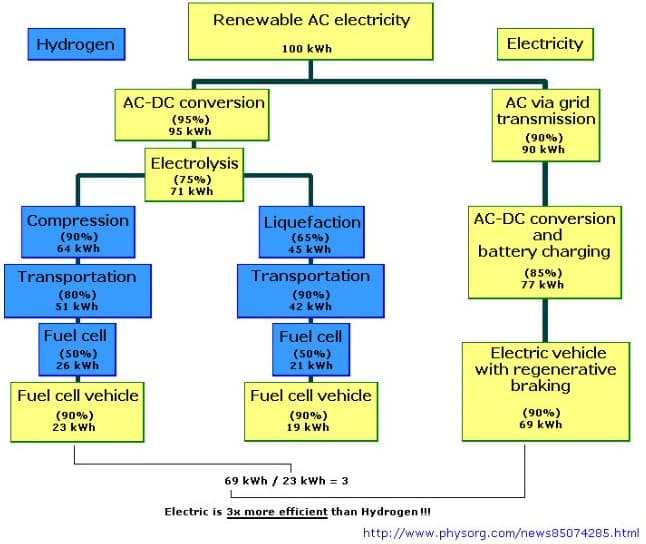Hydrogen Vs. Battery Electric Buses: Comparing The Future Of European Public Transport

Table of Contents
Environmental Impact: Comparing Emissions and Lifecycle Assessments
The environmental impact is a paramount concern when choosing between hydrogen and battery-electric buses. A thorough well-to-wheel analysis is crucial, considering emissions across the entire lifecycle, from production to disposal.
Greenhouse Gas Emissions
- Direct Emissions: Battery-electric buses produce zero tailpipe emissions during operation. Hydrogen buses also boast zero tailpipe emissions, emitting only water vapor.
- Indirect Emissions: The environmental footprint of battery-electric buses heavily depends on the electricity source used for charging. If the grid relies heavily on fossil fuels, the indirect emissions can be significant. However, with increasing renewable energy sources in Europe, this impact is steadily decreasing.
- Hydrogen Production Emissions: The emissions associated with hydrogen production vary drastically. "Grey hydrogen" produced from natural gas generates substantial CO2 emissions. Conversely, "green hydrogen," produced via electrolysis using renewable energy, results in near-zero emissions.
Data from the European Environment Agency (EEA) and various research institutions show that the lifecycle greenhouse gas emissions of battery-electric buses are generally lower than those of grey hydrogen buses. However, green hydrogen buses present a significantly cleaner alternative, potentially surpassing battery-electric options in overall environmental performance, especially if renewable energy sources continue to expand.
Air Pollution
Both technologies significantly reduce local air pollution compared to diesel buses. However, there are subtle differences.
- Particulate Matter and NOx: Battery-electric buses produce virtually no particulate matter or NOx emissions during operation, leading to significant improvements in air quality, particularly in urban areas. Hydrogen buses, while producing only water vapor, may have trace emissions depending on the fuel cell technology.
- Respiratory Health: The reduction in air pollutants from both technologies contributes to improved public health, especially for vulnerable populations like children and the elderly who are highly sensitive to air pollution.
- EU Emission Standards: Both hydrogen and battery-electric buses readily comply with stringent EU emission standards, far exceeding the capabilities of traditional diesel buses.
Studies conducted by ICCT and other reputable organizations consistently demonstrate the superior air quality benefits of both battery-electric and green hydrogen buses compared to their diesel counterparts.
Infrastructure Requirements and Costs
The infrastructure requirements and associated costs are crucial factors influencing the adoption of each technology.
Refueling/Charging Infrastructure
- Capital Costs: Establishing a widespread hydrogen refueling network requires substantial upfront investment in specialized infrastructure. The costs of building and maintaining hydrogen refueling stations are currently significantly higher than setting up charging stations for battery-electric buses.
- Geographical Distribution: Charging stations for battery-electric buses can be more easily distributed across a city, requiring less dedicated space and specialized equipment compared to hydrogen refueling stations.
- Speed of Refueling/Charging: Refueling hydrogen buses is currently faster than charging battery-electric buses. However, battery charging technology is rapidly improving, closing the gap in refueling times.
Estimates by various consulting firms indicate the high initial capital expenditure required for a hydrogen infrastructure in Europe compared to the more readily scalable and lower-cost charging network for battery-electric vehicles.
Total Cost of Ownership (TCO)
- Purchase Price: Currently, hydrogen buses have a higher purchase price compared to battery-electric buses.
- Energy Costs: The cost of hydrogen fuel is often higher than electricity, though this can vary depending on hydrogen production methods and electricity prices.
- Maintenance Costs: Both technologies have relatively low maintenance costs compared to diesel buses, however long-term comparisons are still emerging.
- Lifespan: The lifespan of both types of buses and their key components are critical factors in overall TCO calculations, with further research needed to determine the long-term economic performance.
Several studies analyzing the TCO suggest that battery-electric buses currently possess a lower TCO in many scenarios, especially in regions with abundant renewable energy sources. However, the TCO of hydrogen buses could become competitive with advancements in hydrogen production and infrastructure development.
Technological Maturity and Performance
The technological readiness and performance characteristics of both technologies are critical for their widespread adoption.
Range and Refueling/Charging Time
- Range: Hydrogen buses generally offer longer ranges compared to current battery-electric buses, potentially advantageous for longer routes and less frequent refueling stops.
- Refueling/Charging Time: While hydrogen refueling is faster, the range advantage and charging time for battery-electric buses are continuously improving with technological innovation.
- Operational Efficiency: The range and refueling/charging times directly impact operational efficiency, influencing scheduling, routing, and overall service delivery.
Real-world data from pilot projects in European cities show the comparative range and refueling/charging times for both types of buses.
Technological Readiness and Scalability
- Bus Availability: Battery-electric buses are currently more readily available from a wider range of manufacturers than hydrogen buses.
- Infrastructure Development: The established charging infrastructure for battery-electric vehicles has a significant advantage over the nascent hydrogen refueling infrastructure.
- Technological Advancements: Both technologies are undergoing continuous improvement, with innovations in battery technology and hydrogen fuel cell efficiency constantly pushing the boundaries.
Major manufacturers like Volvo, BYD, and Solaris are actively involved in both battery-electric and hydrogen bus production. However, the scalability of hydrogen bus production and infrastructure remains a key challenge.
Public Acceptance and Social Impact
Public perception and social impacts also influence the adoption of these technologies.
Public Perception and Safety Concerns
- Public Perception Surveys: Public perception surveys reveal that concerns about the safety of hydrogen, particularly its flammability, still exist, though these concerns are often mitigated through robust safety regulations and design features.
- Safety Regulations: Stringent safety regulations and procedures govern the production, storage, and handling of hydrogen, ensuring the safety of both operators and the public.
- Media Coverage: Media coverage plays a role in shaping public perception, and balanced reporting is crucial for promoting a realistic understanding of both technologies.
Studies exploring public attitudes highlight the need for ongoing communication and education to address any misconceptions regarding the safety and reliability of hydrogen technology.
Job Creation and Economic Opportunities
- Direct Job Creation: Both technologies create direct jobs in manufacturing, operation, and maintenance.
- Indirect Job Creation: Hydrogen production and infrastructure development, especially green hydrogen, offer potentially significant opportunities for creating indirect jobs in related industries.
- Regional Economic Development: The adoption of either technology can stimulate regional economic development through investment in manufacturing facilities and infrastructure.
Reports from various economic research institutions have analyzed the potential for job creation and economic impact associated with both hydrogen and battery-electric bus deployments in Europe.
Conclusion: Choosing the Right Path for European Public Transport
This comparison of hydrogen vs. battery-electric buses reveals that both technologies offer significant advantages in reducing greenhouse gas emissions and improving local air quality compared to diesel buses. Battery-electric buses currently hold an edge in terms of cost-effectiveness, technological maturity, and readily available infrastructure. However, green hydrogen buses offer a compelling long-term solution with potentially superior environmental performance, especially if renewable energy sources power hydrogen production. The optimal choice depends on specific local contexts, considering factors such as energy mix, geographical constraints, and economic conditions. A combination of both technologies or even hybrid solutions might ultimately provide the most effective path towards a sustainable public transport system in Europe. The future likely involves a diverse approach, utilizing both hydrogen and battery-electric buses where each technology is most suitable.
To ensure a sustainable and efficient future for European public transport, continued research, investment, and open discussion on hydrogen vs. battery electric buses are essential. Engage in the conversation and contribute to shaping a cleaner, greener future for European cities.

Featured Posts
-
 Comprendre Le Conclave Le Systeme Electoral Du Pape
May 07, 2025
Comprendre Le Conclave Le Systeme Electoral Du Pape
May 07, 2025 -
 How Cobra Kai Continues The Karate Kid Legacy A Detailed Look At Continuity
May 07, 2025
How Cobra Kai Continues The Karate Kid Legacy A Detailed Look At Continuity
May 07, 2025 -
 The Cavaliers Charles Barkleys Unexpected Assessment
May 07, 2025
The Cavaliers Charles Barkleys Unexpected Assessment
May 07, 2025 -
 The Ai Race How The Us And China Surpassed The Middle East
May 07, 2025
The Ai Race How The Us And China Surpassed The Middle East
May 07, 2025 -
 Spion Peter Tazelaar De Biografie Van Een Echte Soldaat Van Oranje
May 07, 2025
Spion Peter Tazelaar De Biografie Van Een Echte Soldaat Van Oranje
May 07, 2025
Latest Posts
-
 De Andre Hopkins Joins Baltimore Ravens Contract Breakdown And Impact
May 08, 2025
De Andre Hopkins Joins Baltimore Ravens Contract Breakdown And Impact
May 08, 2025 -
 Nc State Loses Kendrick Raphael Rising Junior Running Back Decommits
May 08, 2025
Nc State Loses Kendrick Raphael Rising Junior Running Back Decommits
May 08, 2025 -
 Nfl News Browns Sign Experienced Wide Receiver And Return Specialist
May 08, 2025
Nfl News Browns Sign Experienced Wide Receiver And Return Specialist
May 08, 2025 -
 Jokic I Dzordan Tradicija Tri Poljupca I Uloga Bobija Marjanovica
May 08, 2025
Jokic I Dzordan Tradicija Tri Poljupca I Uloga Bobija Marjanovica
May 08, 2025 -
 Westbrook Leads Nuggets In Birthday Song For Jokic
May 08, 2025
Westbrook Leads Nuggets In Birthday Song For Jokic
May 08, 2025
